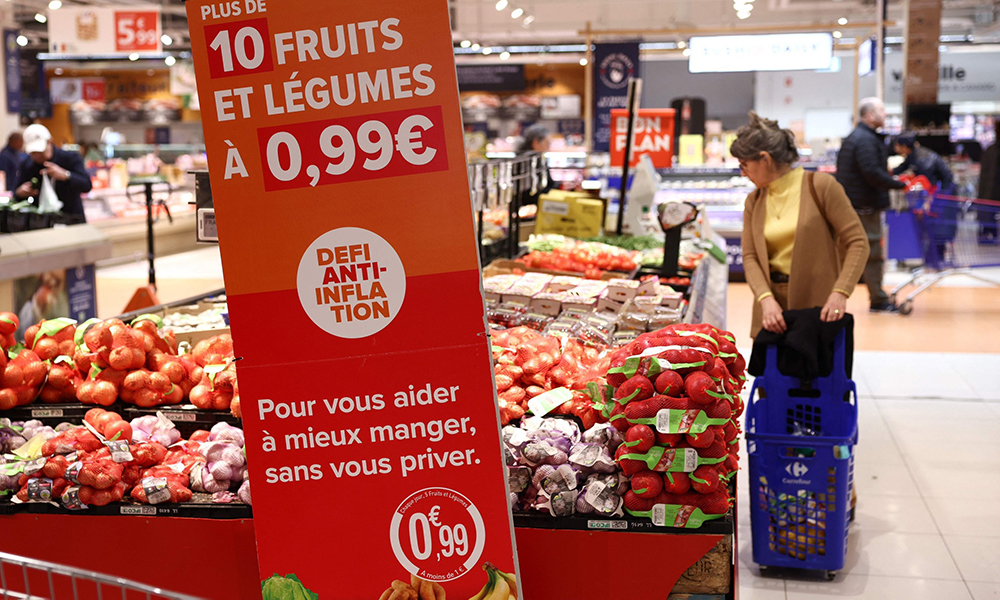
家樂福(Carrefour)與百事公司(PepsiCo)的爭端升級。法國食品雜貨巨頭家樂福不再滿足于像2023年秋天一樣,僅僅標(biāo)注百事公司“縮水式通脹”的商品。所謂“縮水式通脹”是指在價(jià)格不變、甚至上漲的情況下,商品包裝內(nèi)的容量減少。從1月4日開始,該連鎖超市在四個國家的店內(nèi)掛出了“無法接受的漲價(jià)”的標(biāo)志,意在告訴這些國家的購物者,家樂福超市停止出售百事公司的商品。
從上周開始,家樂福在法國、意大利、西班牙和比利時(shí)執(zhí)行這些調(diào)整,這意味著消費(fèi)者將更難找到奇多(Cheetos)、多力多滋(Doritos)和桂格(Quaker)燕麥等商品。
但這只是兩家大公司之間的最新沖突。2023年9月,家樂福開始在貨架上標(biāo)注過分縮水式通脹的商品,主要目標(biāo)便是百事公司。標(biāo)簽上寫道:“該商品容量或重量減少,但供應(yīng)商實(shí)際價(jià)格上漲。”
食品雜貨批發(fā)協(xié)會(Institute of Grocery Distribution)的首席經(jīng)濟(jì)學(xué)家詹姆斯·沃頓認(rèn)為,將商品下架是“最后的手段”,他對路透社(Reuters)表示:“如果人們想要購買的商品被下架,最終結(jié)果將是兩敗俱傷。”
但家樂福的做法得到了歐洲各國政府的支持。政府一直在說服大公司降價(jià),以應(yīng)對通貨膨脹。
家樂福的首席執(zhí)行官亞歷山大·邦帕德曾經(jīng)在2023年表示,盡管原材料成本下降,但消費(fèi)品公司卻拒絕配合降價(jià)。法國財(cái)政部部長布魯諾·勒梅爾認(rèn)同他的觀點(diǎn),并特別提到了百事公司、聯(lián)合利華(Unilever)和雀巢(Nestlé)。
勒梅爾在2023年4月說:“當(dāng)物價(jià)上漲時(shí),各公司馬上漲價(jià),但當(dāng)小麥降價(jià)時(shí),意大利面的價(jià)格卻在三個月后才下調(diào),這讓我不能理解。這是不可接受的。”他警告稱:“我會盡我所能,保證大型實(shí)業(yè)公司同意降價(jià)。”
據(jù)路透社報(bào)道,法國政府已經(jīng)要求零售商和供應(yīng)商在今年1月完成年度價(jià)格談判,比以往提前了幾個月時(shí)間。法國通過一種不同尋常的做法保護(hù)農(nóng)戶,即強(qiáng)制超市每年只能進(jìn)行一次價(jià)格談判,2023年的價(jià)格談判恰逢高通脹期間。
標(biāo)注“縮水式通脹”商品的目的是讓供應(yīng)商重新考慮其定價(jià)政策,但從家樂福上周的動作來看,這在百事公司身上并沒有產(chǎn)生效果。家樂福并非唯一一家在歐洲表明立場的連鎖超市。其比利時(shí)競爭對手克魯特(Colruyt)表示,由于價(jià)格分歧,該公司將停止銷售億滋國際[Mondelez,奧利奧(Oreos)和費(fèi)城奶油奶酪(Philadelphia cream cheese)的生產(chǎn)商]的商品。據(jù)路透社報(bào)道,該食品雜貨零售商稱,隨著能源和原材料價(jià)格的下降,漲價(jià)已經(jīng)沒有合理的理由。(財(cái)富中文網(wǎng))
譯者:劉進(jìn)龍
審校:汪皓
家樂福(Carrefour)與百事公司(PepsiCo)的爭端升級。法國食品雜貨巨頭家樂福不再滿足于像2023年秋天一樣,僅僅標(biāo)注百事公司“縮水式通脹”的商品。所謂“縮水式通脹”是指在價(jià)格不變、甚至上漲的情況下,商品包裝內(nèi)的容量減少。從1月4日開始,該連鎖超市在四個國家的店內(nèi)掛出了“無法接受的漲價(jià)”的標(biāo)志,意在告訴這些國家的購物者,家樂福超市停止出售百事公司的商品。
從上周開始,家樂福在法國、意大利、西班牙和比利時(shí)執(zhí)行這些調(diào)整,這意味著消費(fèi)者將更難找到奇多(Cheetos)、多力多滋(Doritos)和桂格(Quaker)燕麥等商品。
但這只是兩家大公司之間的最新沖突。2023年9月,家樂福開始在貨架上標(biāo)注過分縮水式通脹的商品,主要目標(biāo)便是百事公司。標(biāo)簽上寫道:“該商品容量或重量減少,但供應(yīng)商實(shí)際價(jià)格上漲。”
食品雜貨批發(fā)協(xié)會(Institute of Grocery Distribution)的首席經(jīng)濟(jì)學(xué)家詹姆斯·沃頓認(rèn)為,將商品下架是“最后的手段”,他對路透社(Reuters)表示:“如果人們想要購買的商品被下架,最終結(jié)果將是兩敗俱傷。”
但家樂福的做法得到了歐洲各國政府的支持。政府一直在說服大公司降價(jià),以應(yīng)對通貨膨脹。
家樂福的首席執(zhí)行官亞歷山大·邦帕德曾經(jīng)在2023年表示,盡管原材料成本下降,但消費(fèi)品公司卻拒絕配合降價(jià)。法國財(cái)政部部長布魯諾·勒梅爾認(rèn)同他的觀點(diǎn),并特別提到了百事公司、聯(lián)合利華(Unilever)和雀巢(Nestlé)。
勒梅爾在2023年4月說:“當(dāng)物價(jià)上漲時(shí),各公司馬上漲價(jià),但當(dāng)小麥降價(jià)時(shí),意大利面的價(jià)格卻在三個月后才下調(diào),這讓我不能理解。這是不可接受的。”他警告稱:“我會盡我所能,保證大型實(shí)業(yè)公司同意降價(jià)。”
據(jù)路透社報(bào)道,法國政府已經(jīng)要求零售商和供應(yīng)商在今年1月完成年度價(jià)格談判,比以往提前了幾個月時(shí)間。法國通過一種不同尋常的做法保護(hù)農(nóng)戶,即強(qiáng)制超市每年只能進(jìn)行一次價(jià)格談判,2023年的價(jià)格談判恰逢高通脹期間。
標(biāo)注“縮水式通脹”商品的目的是讓供應(yīng)商重新考慮其定價(jià)政策,但從家樂福上周的動作來看,這在百事公司身上并沒有產(chǎn)生效果。家樂福并非唯一一家在歐洲表明立場的連鎖超市。其比利時(shí)競爭對手克魯特(Colruyt)表示,由于價(jià)格分歧,該公司將停止銷售億滋國際[Mondelez,奧利奧(Oreos)和費(fèi)城奶油奶酪(Philadelphia cream cheese)的生產(chǎn)商]的商品。據(jù)路透社報(bào)道,該食品雜貨零售商稱,隨著能源和原材料價(jià)格的下降,漲價(jià)已經(jīng)沒有合理的理由。(財(cái)富中文網(wǎng))
譯者:劉進(jìn)龍
審校:汪皓
Carrefour is taking its spat with PepsiCo up a notch. No longer content to, as it did in the fall, label PepsiCo’s examples of “shrinkflation,” a nasty variant of inflation where the bag gets emptier while the price remains the same, or even increases, now the French grocery giant is doubling down. Starting on January 4 with in-store signs that cite “unacceptable price increases,” the supermarket chain is telling shoppers in four countries that it will no longer carry PepsiCo products.
The changes start last week in France, Italy, Spain, and Belgium, meaning Cheetos, Doritos, and Quaker cereals will suddenly be harder to find there.
But this is just the latest clash between the two behemoths. In September, Carrefour started labeling egregious examples of shrinkflation on its shelves, with PepsiCo a prominent target. The labels read: “This product has seen its volume or weight fall and the effective price from the supplier rise.”
James Walton, chief economist at the Institute of Grocery Distribution, calls delisting a “l(fā)ast resort,” telling Reuters that “nobody wins if the goods that people want are not available on the shelves.”
But Carrefour has on its side European governments, which have been pressuring big companies to lower prices in the battle against inflation.
Carrefour CEO Alexandre Bompard argued last year that consumer goods companies were not cooperating with efforts to cut prices, despite the cost of raw materials falling. French finance minister Bruno Le Maire agreed, pointing a finger at PepsiCo, Unilever, and Nestlé, in particular.
“I don’t see why when prices go up companies pass on the increase immediately, but when the price of wheat falls, the price of pasta takes three months to fall. It’s unacceptable,” Le Maire said last April, warning, “I will use all the powers at my disposal to ensure that the big industrial companies pass on the decrease.”
France’s government has asked retailers and suppliers to finish their yearly price negotiations in January, a few months sooner than usual, Reuters reported. France is unusual in that it protects its farmers by forcing supermarkets to negotiate prices only once a year, and last year prices got locked in amid high inflation.
The shrinkflation campaign aimed to make suppliers rethink their pricing policies, but, judging by Carrefour’s move last week, it fell short with PepsiCo. And Carrefour isn’t the only supermarket chain taking a stand in Europe. Its Belgian rival Colruyt said that price disputes spurred it to stop supplies from Mondelez—the maker of Oreos and Philadelphia cream cheese. As Reuters reported, the grocer noted that with energy and raw material prices falling, rate hikes were no longer justifiable.






